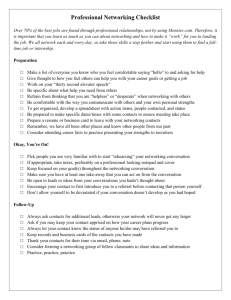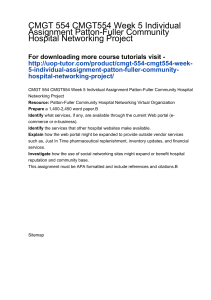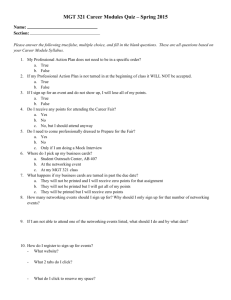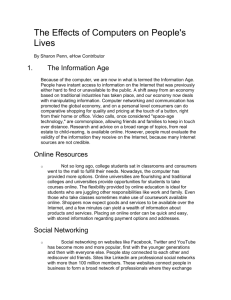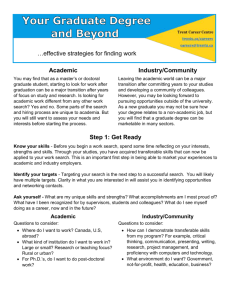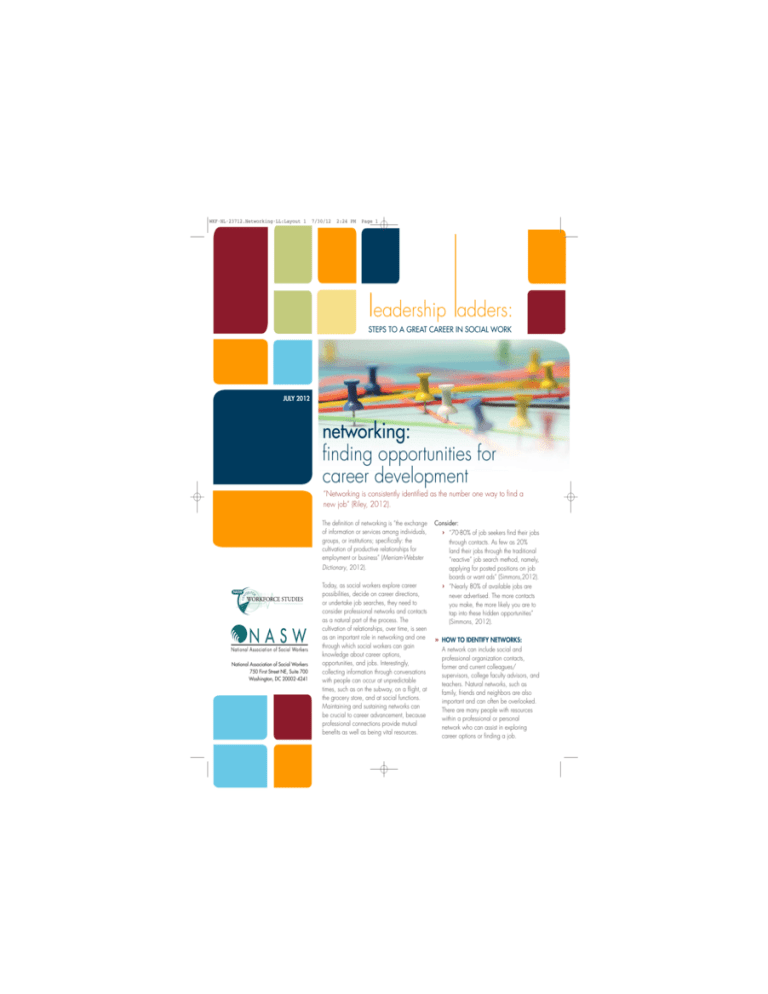
WKF-NL-23712.Networking-LL:Layout 1
7/30/12
2:24 PM
Page 1
leadership
adders:
STEPS TO A GREAT CAREER IN SOCIAL WORK
JULY 2012
networking:
finding opportunities for
career development
“Networking is consistently identified as the number one way to find a
new job” (Riley, 2012).
The definition of networking is “the exchange
of information or services among individuals,
groups, or institutions; specifically: the
cultivation of productive relationships for
employment or business” (Merriam-Webster
Dictionary, 2012).
NASW
National Association of Social Workers
750 First Street NE, Suite 700
Washington, DC 20002-4241
Today, as social workers explore career
possibilities, decide on career directions,
or undertake job searches, they need to
consider professional networks and contacts
as a natural part of the process. The
cultivation of relationships, over time, is seen
as an important role in networking and one
through which social workers can gain
knowledge about career options,
opportunities, and jobs. Interestingly,
collecting information through conversations
with people can occur at unpredictable
times, such as on the subway, on a flight, at
the grocery store, and at social functions.
Maintaining and sustaining networks can
be crucial to career advancement, because
professional connections provide mutual
benefits as well as being vital resources.
Consider:
› “70-80% of job seekers find their jobs
through contacts. As few as 20%
land their jobs through the traditional
“reactive” job search method, namely,
applying for posted positions on job
boards or want ads” (Simmons,2012).
› “Nearly 80% of available jobs are
never advertised. The more contacts
you make, the more likely you are to
tap into these hidden opportunities”
(Simmons, 2012).
»
HOW TO IDENTIFY NETWORKS:
A network can include social and
professional organization contacts,
former and current colleagues/
supervisors, college faculty advisors, and
teachers. Natural networks, such as
family, friends and neighbors are also
important and can often be overlooked.
There are many people with resources
within a professional or personal
network who can assist in exploring
career options or finding a job.
WKF-NL-23712.Networking-LL:Layout 1
7/30/12
2:24 PM
Page 2
Remember, everyone and anyone can be
a potential network contact.
Using various modes of networking
outlets, such as job fairs, alumnae
events/sites, community events, local job
search groups, and social media, can
increase visibility, and connect people for
professional networking and recruitment.
»
In building and
maintaining
these
professional
contacts, social
workers will be
developing a
reciprocal
relationship
where key
resources will
be continuously
available for
future career
networking.
»
INTRODUCING YOURSELF FOR CAREER
DEVELOPMENT AND JOB SEEKING
Consider identifying contacts within a
circle of friends, colleagues, acquaintances,
employers, and professionals who may
have information or know of someone
who may have connections to an area of
interest. Before contacting people,
prepare a concise introduction that states
your areas of interest and objectives.
Seek advice about your introduction from
a few people in the field who are familiar
with you and your job search. Seeking
advice is a crucial component of
networking and can provide a better
understanding of the job market, help to
devise methods to get a job, and
ultimately lead to finding a job.
USING NETWORKING TO GET ADVICE,
INFORMATION AND REFERRALS:
One of the most valuable networking
tools is the informational interview. The
informational interview can be beneficial
because it is an opportunity to learn
about career choices, employers, or
aspects of a particular job. It is an
opportunity to have exploratory
conversation with people in the social
work profession network “who can give
career advice and introduce you to others
who can help you define your goals”
(Cornell, 2012). It is important to be
clear about the purpose and goals of
informational interviewing. A. This
interview is a 15 to 30 minutes meeting,
with an individual, and is an opportunity
to obtain specific information, career
advice and referrals. The information
interview is not a job interview, but rather
is intended to expand professional
contacts that may be helpful at a later
time. Remember, as the initiator of this
»
meeting, there is planning that needs to
take into consideration: identifying
contacts, arranging the meeting,
recognizing time constraints, preparing
content for an agenda, preparing for
dialogue, and follow up.
REFERENCES
Cornell University, Cornell Career Services
(2012), Informational Interviewing.
Retrieved from:
www.career.cornell.edu/students/
options/networking/interviewing.cfm
As a networking tool, the informational
interview is one component to successful
job finding and career development that
requires special attention to follow up
activities. Write a thank you note that
identifies helpful suggestions obtained
from the discussion. Follow up with the
original contact if they have referred you to
another person, and take time to reflect on
what was learned, what information is still
needed, and to develop a plan of action.
Jobvite, (2012). 2011Social recruiting
survey results. Retrieved from:
http://recruiting.jobvite.com/resources/
social-recruiting-survey.php
Riley Guide (March 2012), N
enhance you job search. Retrie
www.rileyguide.com/network.
Simmons College Career Educ
(2012), Optimize your networ
Retrieved from: www.simmons.
alums/toolkit/networking.php
Merriam Webster Dictionary (2012),
Networking. Retrieved from:
www.merriam-webster.com/dictionary/
networking
USING SOCIAL MEDIA NETWORKING
TO INCREASE VISIBILITY AND REACH:
Social media is one of the fastest
growing areas for finding a job and
making contacts. In a recent 2011 survey
by the leading recruiting platform, Jobvite
Survey, reveals that 89 percent of U.S.
companies plan to use social media for
recruiting (Jobvite, 2012). One of the
social media online professional
networks, LinkedIn promotes connections
to people for professional networking and
recruitment. Even though there are other
web sites such as Facebook and
MySpace, LinkedIn caters to business and
professional encounters. Primarily,
LinkedIn is where people can develop
contacts with others who have similar
career interests.
The benefits of networking are
long-lasting and continuous throughout
one’s social work career. Whether
through social media outlets or face to
face meetings, networking provides
opportunities to talk with people,
exchange ideas, and gain knowledge
about career options, opportunities and
jobs. Subsequently, in building and
maintaining these professional contacts,
social workers will be developing a
reciprocal relationship where key
resources will be continuously available
for future career networking.
©2012 National Association of Social Workers. All Rights Reser
WKF-NL-23712.Networking-LL:Layout 1
everyone and anyone can be
network contact.
us modes of networking
h as job fairs, alumnae
s, community events, local job
ups, and social media, can
ibility, and connect people for
l networking and recruitment.
ING YOURSELF FOR CAREER
MENT AND JOB SEEKING
dentifying contacts within a
nds, colleagues, acquaintances,
and professionals who may
mation or know of someone
ave connections to an area of
fore contacting people,
concise introduction that states
of interest and objectives.
e about your introduction from
ple in the field who are familiar
nd your job search. Seeking
crucial component of
and can provide a better
ng of the job market, help to
hods to get a job, and
ead to finding a job.
TWORKING TO GET ADVICE,
ION AND REFERRALS:
most valuable networking
informational interview. The
al interview can be beneficial
s an opportunity to learn
er choices, employers, or
a particular job. It is an
to have exploratory
n with people in the social
ssion network “who can give
ce and introduce you to others
elp you define your goals”
012). It is important to be
the purpose and goals of
al interviewing. A. This
a 15 to 30 minutes meeting,
ividual, and is an opportunity
pecific information, career
referrals. The information
not a job interview, but rather
to expand professional
at may be helpful at a later
mber, as the initiator of this
»
7/30/12
meeting, there is planning that needs to
take into consideration: identifying
contacts, arranging the meeting,
recognizing time constraints, preparing
content for an agenda, preparing for
dialogue, and follow up.
REFERENCES
Cornell University, Cornell Career Services
(2012), Informational Interviewing.
Retrieved from:
www.career.cornell.edu/students/
options/networking/interviewing.cfm
As a networking tool, the informational
interview is one component to successful
job finding and career development that
requires special attention to follow up
activities. Write a thank you note that
identifies helpful suggestions obtained
from the discussion. Follow up with the
original contact if they have referred you to
another person, and take time to reflect on
what was learned, what information is still
needed, and to develop a plan of action.
Jobvite, (2012). 2011Social recruiting
survey results. Retrieved from:
http://recruiting.jobvite.com/resources/
social-recruiting-survey.php
2:24 PM
Page 3
Riley Guide (March 2012), Networking to
enhance you job search. Retrieved from:
www.rileyguide.com/network.html
Simmons College Career Education Center
(2012), Optimize your networking.
Retrieved from: www.simmons.edu/cec/
alums/toolkit/networking.php
Merriam Webster Dictionary (2012),
Networking. Retrieved from:
www.merriam-webster.com/dictionary/
networking
USING SOCIAL MEDIA NETWORKING
TO INCREASE VISIBILITY AND REACH:
Social media is one of the fastest
growing areas for finding a job and
making contacts. In a recent 2011 survey
by the leading recruiting platform, Jobvite
Survey, reveals that 89 percent of U.S.
companies plan to use social media for
recruiting (Jobvite, 2012). One of the
social media online professional
networks, LinkedIn promotes connections
to people for professional networking and
recruitment. Even though there are other
web sites such as Facebook and
MySpace, LinkedIn caters to business and
professional encounters. Primarily,
LinkedIn is where people can develop
contacts with others who have similar
career interests.
The benefits of networking are
long-lasting and continuous throughout
one’s social work career. Whether
through social media outlets or face to
face meetings, networking provides
opportunities to talk with people,
exchange ideas, and gain knowledge
about career options, opportunities and
jobs. Subsequently, in building and
maintaining these professional contacts,
social workers will be developing a
reciprocal relationship where key
resources will be continuously available
for future career networking.
©2012 National Association of Social Workers. All Rights Reserved.

